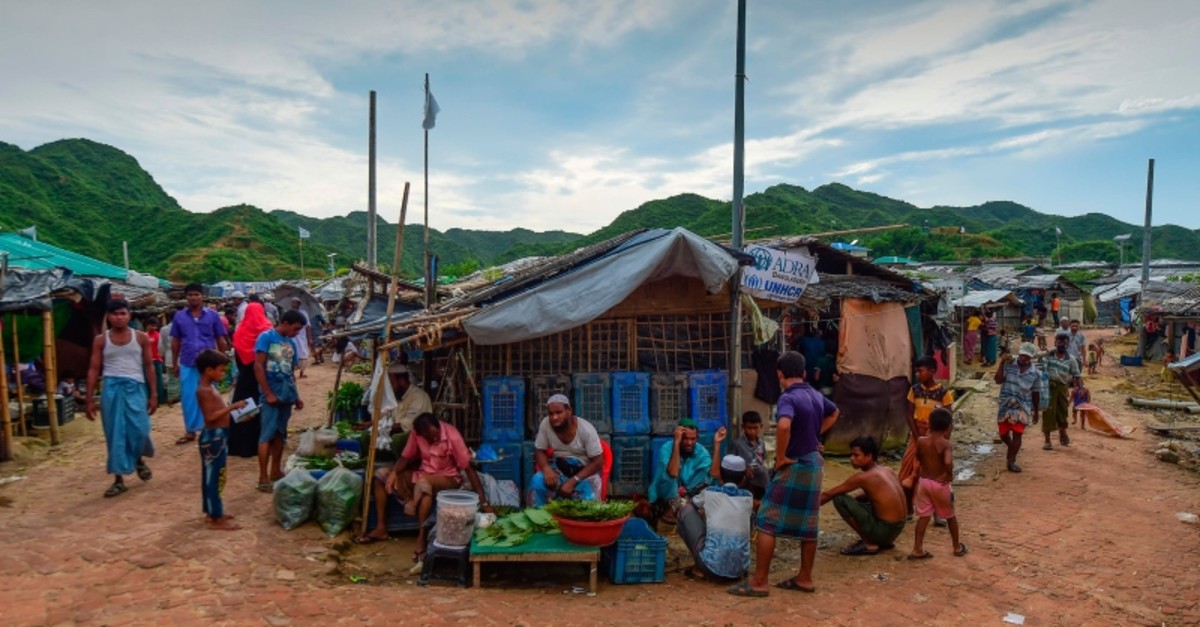
A fresh push to repatriate Rohingya refugees to Myanmar appeared to fall flat Thursday, with no one turning up to hop on five buses and 10 trucks laid on by Bangladesh.
"We have been waiting since 9:00 a.m. (0300 GMT) to take any willing refugees for repatriation," Khaled Hossain, a Bangladesh official in charge of the Teknaf refugee camp, told the French Press Agency (AFP) after over an hour of waiting.
"Nobody has yet turned up."
Members of at least 221 Rohingya Muslim families were interviewed Wednesday and Tuesday ahead of the repatriation that was scheduled to start Thursday. Bangladesh Prime Minister Sheikh Hasina said her government will not force the refugees to return and the repatriation will only happen if they are willing.
Myanmar has certified 3,450 refugees from 1,056 families as eligible for repatriation from Bangladesh's Cox's Bazar district, where about 1 million Rohingya refugees are sheltered.
Myanmar's military began a harsh counterinsurgency campaign against Rohingya Muslims in August 2017 in response to an insurgent attack. More than 700,000 Rohingya fled what has been called an ethnic cleansing campaign involving mass rapes, killings and burning of thousands of their homes.
The U.N. refugee agency "is working with concerned governments to help create conditions conducive to return, to assess whether or not these people are going back voluntarily," U.N. spokesman Stephane Dujarric said in New York.
"The voluntary nature of repatriation is really a bedrock of our position," he said.
Dujarric said Secretary-General Antonio Gutteres, a former U.N. refugee chief, has stressed that it's important for refugees to have the information they need to decide whether or not to return.
The latest repatriation attempt — a previous push failed in November — follows a visit last month to the camps by high-ranking officials from Myanmar led by Permanent Foreign Secretary Myint Thu.
Bangladesh's Foreign Ministry forwarded a list of more than 22,000 refugees to Myanmar for verification and Naypyidaw cleared 3,450 individuals for "return."
But on Wednesday, several Rohingya refugees whose names were listed told AFP that said they did not want to return unless their safety was ensured and they were granted citizenship.
"It is not safe to return to Myanmar," one of them, Nur Islam, said.
Officials from the U.N. and Bangladesh's refugee commission have also been interviewing Rohingya families in the settlements to find out if they wanted to return.
"We have yet to get consent from any refugee family," a U.N. official said Wednesday.
Rohingya community leader Jafar Alam told AFP the refugees had been gripped by fear since authorities announced the fresh repatriation process.
They also feared being sent to camps for internally displaced people (IDP) if they went back to Myanmar.
Bangladesh refugee commissioner Mohammad Abul Kalam said they were "fully prepared" for the repatriation with security being tightened across the refugee settlements to prevent any violence or protests.
Officials said they would wait for a few more hours before deciding whether to postpone the repatriation move.
The U.N. Security Council met behind closed doors on the issue on Wednesday.
Sunday will mark the second anniversary of the crackdown that sparked the mass exodus to the Bangladesh camps.
Myanmar has long not recognized Rohingya as citizens, rendering them stateless, and they face other forms of state-sanctioned discrimination.
A U.N.-established investigation last year recommended the prosecution of Myanmar's top military commanders on charges of genocide, war crimes and crimes against humanity for the crackdown on the Rohingya. Myanmar has rejected the report and any suggestion its forces did anything wrong.
